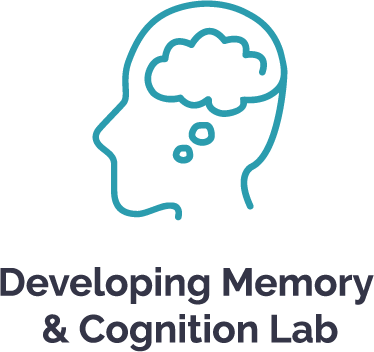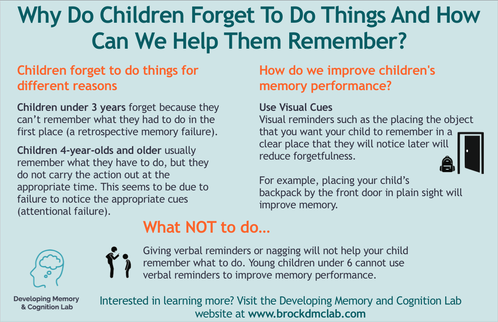The Development of Prospective Memory and Self-Control
How do children remember to carry out their future intentions such as bringing an item to show-and-tell or putting a bicycle helmet on before taking a bike ride? This ability to remember to perform activities in the future is called prospective memory and is a critical skill for children to develop in order to function independently and successfully in their daily lives.
Our lab is interested in how prospective memory develops across early childhood, what factors affect its development, and the mechanisms responsible for age-related improvements and declines across development. A main question that drives our current research program is why do children forget to carry out future intentions? Are these prospective memory failures due to failures in retrospective memory (struggling with remembering what they have to do) or executive functioning (struggling to detect and carry out the intention at the appropriate time)? Dr. Mahy recently wrote an article in The Conversation about preschooler's forgetfulness that features some of our lab's recent research.
Several studies have examined how what happens prior to a prospective memory task (specifically in the delay interval) affects children's prospective memory. A series of studies have examined the impact of the length of the delay interval (Mahy & Moses, 2011) and the content of the delay interval (Mahy & Moses, 2005; Mahy, Mohun, Mueller, & Moses, 2016) on children's ability to remember to carry out their future intentions. Results suggest that more difficult tasks and tasks that interfere with subvocal rehearsal of the prospective intention negatively affect children's later prospective memory performance.
Recent work has focused on the role of verbal reminders on young children's prospective memory (Mahy, Mazachowsky, & Pagobo, 2019; Maguire & Mahy, in progress) as well as the role of metacognitive abilities in children's prospective memory performance (Lavis & Mahy, 2021).
Current research is examining:
(1) why 3- and 4-year-olds often forget to carry out their future intentions (Mahy, Conversano, Mazachowsky, & Lavis, in progress)
(2) the role of different types of verbal reminders in children's prospective memory performance (Maguire & Mahy, in progress)
(1) why 3- and 4-year-olds often forget to carry out their future intentions (Mahy, Conversano, Mazachowsky, & Lavis, in progress)
(2) the role of different types of verbal reminders in children's prospective memory performance (Maguire & Mahy, in progress)
Relevant Publications
Mahy, C. E. V., Kamber, E., Conversano, M. C., Mueller, U., & Zuber, S. (2024). A parent-report diary study of young children’s prospective memory successes and failures. Journal of Cognition and Development, 25, 350-372. [PDF]
Fuke, T. S. S. & Mahy, C. E. V. (2022). Executive and retrospective memory processes in preschoolers’ prospective memory development. Cognitive Development, 62, 101172. [PDF]
Mahy, C. E. V. (2022). The development of prospective memory during childhood. In M. Courage & N. Cowan (Eds.), The Development of Memory in Infancy and Childhood. New York: Taylor & Francis.
Mahy, C. E. V. (2021). The development of children’s prospective memory: Lessons for developmental science. Child Development Perspectives, 16, 41-47. [PDF]
Mazachowsky, T. R., Hamilton, C., & Mahy, C. E. V. (2021). What supports the development of children’s prospective memory? Using a parent-report to examine the relation between children’s memory techniques, parent scaffolding, and children’s prospective memory. Journal of Cognition and Development, 22, 721-743. [PDF]
Moeller, S. A., Mazachowsky, T. R., Lavis, L., Gluck, S., & Mahy, C. E. V. (2021). Adults’ perceptions of forgetful children: The impact of child age, domain, and memory type. Memory. [PDF]
Lavis, L., & Mahy, C. E. V. (2021). “I’ll remember everything no matter what!”: The role of metacognitive abilities in the development of young children’s prospective memory. Journal of Experimental Child Psychology, 207, 105117. [PDF]
Zuber, S., Mahy, C. E. V., & Kliegel, M. (2019). How executive functions are associated with event-based and time-based prospective memory during childhood. Cognitive Development, 50, 66-79. [PDF]
Mahy, C. E. V., Mazachowsky, T. R., & Pagobo, J. R. (2018). Do verbal reminders improve preschoolers’ prospective memory performance? It depends on age and individual differences. Cognitive Development, 47, 158-167. [PDF]
Mahy, C. E. V., Mohun, H., Müller, U., & Moses, L. J. (2016). The role of subvocal rehearsal in preschool children’s prospective memory. Cognitive Development, 39, 189-196. doi: 10.1016/j.cogdev.2016.07.001 [PDF]
Mahy, C. E. V., & Munakata, Y. (2015). Transitions in executive function: Insights from developmental parallels between prospective memory and cognitive flexibility. Child Development Perspectives, 9, 128-132. doi: 10.1111/cdep.12121 [PDF]
Mahy, C. E. V., Voigt, B., Ballhausen, N., Schnitzspahn, K., Ellis, J., & Kliegel, M. (2015). The impact of cognitive control on children’s goal monitoring in a time-based prospective memory task. Child Neuropsychology, 21, 823-839.
doi: 10.1080/09297049.2014.967202 [PDF]
Mahy, C. E. V., & Moses, L. J. (2015). The effect of retention interval task difficulty on children’s prospective memory: Testing the intention monitoring hypothesis. Journal of Cognition and Development, 16, 742-758. doi: 10.1080/15248372.2014.930742 [PDF]
Mahy, C. E. V., Moses, L. J., & Kliegel, M. (2014). The development of prospective memory in children: An executive framework. Developmental Review, 34, 305-326. doi: 10.1016/j.dr.2014.08.001 [PDF]
Voigt, B., Mahy, C. E. V., Ellis, J., Schnitzspahn, K., Altgassen, M., & Kliegel, M. (2014). The development of time-based prospective memory in childhood: The role of working memory updating. Developmental Psychology, 50, 2393-2404.
doi: 10.1037/a0037491 [PDF]
Mahy, C. E. V., Moses, L. J., & Kliegel, M. (2014). The impact of age, ongoing task difficulty, and cue salience on preschoolers’ prospective memory performance: The role of executive function. Journal of Experimental Child Psychology, 127, 52-64. doi: 10.1016/j.jecp.2014.01.006 [PDF]
Mahy, C. E. V., Kliegel, M., & Marcovitch, S. (2014). Emerging themes in the development of prospective memory during childhood. Journal of Experimental Child Psychology, 127, 1-7. doi: 0.1016/j.jecp.2014.04.003 [PDF]
Kliegel, M., Mahy, C. E. V., Voigt, B., Henry, J. D., Rendell, P. G., & Aberle, I. (2013). The development of prospective memory in young school children: The impact of ongoing task absorption, cue salience, and cue centrality. Journal of Experimental Child Psychology, 116, 792-810. doi: 10.1016/j.jecp.2013.07.012 [PDF]
Mahy, C. E. V., & Moses, L. J. (2011). Executive functioning and prospective memory in young children. Cognitive Development, 26, 269-281. doi:10.1016/j.cogdev.2011.06.002 [PDF]
Fuke, T. S. S. & Mahy, C. E. V. (2022). Executive and retrospective memory processes in preschoolers’ prospective memory development. Cognitive Development, 62, 101172. [PDF]
Mahy, C. E. V. (2022). The development of prospective memory during childhood. In M. Courage & N. Cowan (Eds.), The Development of Memory in Infancy and Childhood. New York: Taylor & Francis.
Mahy, C. E. V. (2021). The development of children’s prospective memory: Lessons for developmental science. Child Development Perspectives, 16, 41-47. [PDF]
Mazachowsky, T. R., Hamilton, C., & Mahy, C. E. V. (2021). What supports the development of children’s prospective memory? Using a parent-report to examine the relation between children’s memory techniques, parent scaffolding, and children’s prospective memory. Journal of Cognition and Development, 22, 721-743. [PDF]
Moeller, S. A., Mazachowsky, T. R., Lavis, L., Gluck, S., & Mahy, C. E. V. (2021). Adults’ perceptions of forgetful children: The impact of child age, domain, and memory type. Memory. [PDF]
Lavis, L., & Mahy, C. E. V. (2021). “I’ll remember everything no matter what!”: The role of metacognitive abilities in the development of young children’s prospective memory. Journal of Experimental Child Psychology, 207, 105117. [PDF]
Zuber, S., Mahy, C. E. V., & Kliegel, M. (2019). How executive functions are associated with event-based and time-based prospective memory during childhood. Cognitive Development, 50, 66-79. [PDF]
Mahy, C. E. V., Mazachowsky, T. R., & Pagobo, J. R. (2018). Do verbal reminders improve preschoolers’ prospective memory performance? It depends on age and individual differences. Cognitive Development, 47, 158-167. [PDF]
Mahy, C. E. V., Mohun, H., Müller, U., & Moses, L. J. (2016). The role of subvocal rehearsal in preschool children’s prospective memory. Cognitive Development, 39, 189-196. doi: 10.1016/j.cogdev.2016.07.001 [PDF]
Mahy, C. E. V., & Munakata, Y. (2015). Transitions in executive function: Insights from developmental parallels between prospective memory and cognitive flexibility. Child Development Perspectives, 9, 128-132. doi: 10.1111/cdep.12121 [PDF]
Mahy, C. E. V., Voigt, B., Ballhausen, N., Schnitzspahn, K., Ellis, J., & Kliegel, M. (2015). The impact of cognitive control on children’s goal monitoring in a time-based prospective memory task. Child Neuropsychology, 21, 823-839.
doi: 10.1080/09297049.2014.967202 [PDF]
Mahy, C. E. V., & Moses, L. J. (2015). The effect of retention interval task difficulty on children’s prospective memory: Testing the intention monitoring hypothesis. Journal of Cognition and Development, 16, 742-758. doi: 10.1080/15248372.2014.930742 [PDF]
Mahy, C. E. V., Moses, L. J., & Kliegel, M. (2014). The development of prospective memory in children: An executive framework. Developmental Review, 34, 305-326. doi: 10.1016/j.dr.2014.08.001 [PDF]
Voigt, B., Mahy, C. E. V., Ellis, J., Schnitzspahn, K., Altgassen, M., & Kliegel, M. (2014). The development of time-based prospective memory in childhood: The role of working memory updating. Developmental Psychology, 50, 2393-2404.
doi: 10.1037/a0037491 [PDF]
Mahy, C. E. V., Moses, L. J., & Kliegel, M. (2014). The impact of age, ongoing task difficulty, and cue salience on preschoolers’ prospective memory performance: The role of executive function. Journal of Experimental Child Psychology, 127, 52-64. doi: 10.1016/j.jecp.2014.01.006 [PDF]
Mahy, C. E. V., Kliegel, M., & Marcovitch, S. (2014). Emerging themes in the development of prospective memory during childhood. Journal of Experimental Child Psychology, 127, 1-7. doi: 0.1016/j.jecp.2014.04.003 [PDF]
Kliegel, M., Mahy, C. E. V., Voigt, B., Henry, J. D., Rendell, P. G., & Aberle, I. (2013). The development of prospective memory in young school children: The impact of ongoing task absorption, cue salience, and cue centrality. Journal of Experimental Child Psychology, 116, 792-810. doi: 10.1016/j.jecp.2013.07.012 [PDF]
Mahy, C. E. V., & Moses, L. J. (2011). Executive functioning and prospective memory in young children. Cognitive Development, 26, 269-281. doi:10.1016/j.cogdev.2011.06.002 [PDF]





